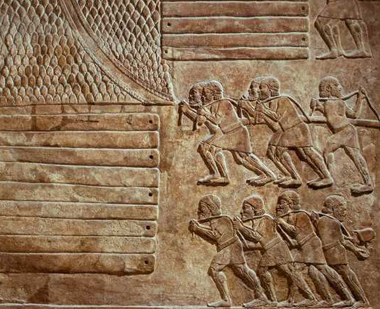Iraq is an enormous tourist treasure, either for what God Almighty has granted him of natural resources such as fertile land, fresh water sources, oil affluence and other natural resources, in addition to fascinating regions in northern Iraq where are the springs, waterfalls and lakes in the middle and the south, as well as what folk Iraqi heritage stores of ancient civilizations outcomes that had followed in succession onto its land.
So, the territory between the two rivers or Mesopotamia –as it is named in Greek language–in the sense of "two rivers" was the first civilized centers in the world, the need of Iraqi man for defense or irrigation was in the forefront of motives that helped in the formation of the first civilization in Mesopotamia, so her population fenced their towns and laid channels. After the year 6000 BC the settlements, that became later towns in the 4th millennium BC, had appeared, however, it can be said in the light of archeological discoveries, that the first human settlements that were erected in Iraq were (Aredo and Uruk in the south) where temples were built of mud brick, decorated with metallic and stony artifacts, and wherein cuneiform writing was invented and Sumerian civilization emerged in 3400 BC, one of the oldest known human civilizations, Sumerians were responsible for the first culture in these areas, and from there it spread to the upper Euphrates, nonetheless, it could be said that the most important Sumerian cities that had arisen then were: Eisin, Kish, Larsa, Ur, and Adab; and in 2330 BC Akkadians came out, they are Semitic peoples who lived in the center of Mesopotamia, their king Sargon I (2335 BC –2279 BC) had founded the kingdom of Akkad and thus Akkadian language replaced the Sumerian's. Akkadians reign had continued until the fall of "Aljutibin" in 2218 BC, these are tribes from the eastern hills–and after some time the third era of Ur city emerged and ruled the most part of Mesopotamia country.
Thereafter came Elamites and destroyed Ur in 2000 BC, and took control of most ancient cities, however, they did not add anything new until the time of Hammurabi from Babylon who unified the state for a few years at the end of his reign, but Amoria Dynasty took power in Assyria in the north… it was the Hittites coming from Anatolia who could bring down the Babylonians to be followed immediately by Alkixion and govern the country for four centuries, thereafter the Mitanni took over, they are non–Semitic people known often as Hurion or the Huryanion (coming from Caucasus) and could deploy since the year 1700 BC and in large numbers across the north in all Anatolia. The state of Assyria in Mesopotamia emerged, it defeated the Mitanni and seized Babylon city in 1255 BC and could reach the Mediterranean in 100 BC.
At about 612 BC, Babylon demolished Nineveh the capital of Assyrians, and in 538 BC Cyrus the Great, the empire of Persia invaded Iraq, followed by Alexander the Great who invaded it in 331 BC, then conquered by the Romans until it was submitted to the rule of Sassanid empire, till the Islamic conquest in 637 BC, and in the year 770 AD the capital of Islamic state moved to Baghdad until the year 1258 AD whereupon the Mongols conquered and burned it under the command of Hulagu.
In the year 1401 AD, Mongol leader Tamerlane destroyed it again, and in 1533 the Ottoman Sultan Suleiman the Magnificent annexed Iraq to the Ottoman Empire, after the defeat of Ottoman in World War I (1914–1918) Iraq was occupied by the British forces. However, in the year 1920, the League of Nations placed Iraq under the British mandate, in 1921 Britain recognized Iraq as a kingdom under the throne of prince Faisal bin Sharif Hussein–in 1932 Britain ended its mandate and Iraq got his independence, in 1958 monarchy ended in Iraq and republican government has started when a military coup under the leadership of staff colonel Abdul Kareem Qasim, paving the way for Iraq to enter in a vortex of internal military coups and then the external wars, which ended in the fall of the former regime in the 9th of April 2003 to start a new stage of building a democratic civilian regime in Iraq.
Source: Al Sabah newspaper

